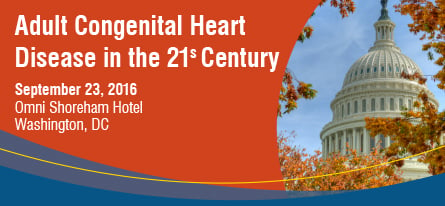Adult Congenital Heart Disease in the 21st Century
| Location: | Omni Shoreham Hotel |
2500 Calvert St NW Washington, Washington DC |
Description
<p>This conference will focus on several challenging aspects of CHD including the management of the adult patient with tetralogy of Fallot, transposition of the great arteries, and the pregnant patient with CHD. Specifically, the conference will address utilizing innovative imaging, medical and surgical/catheter based therapies in the evaluation and treatment of these patients.</p>
 Course Description:
Course Description:
Due to advances in medical and surgical therapies for patients with congenital heart disease (CHD), children and adolescents with CHD have over a 90% survival rate. As a result, the number of adults with CHD in the United States has now surpassed the number of children with these conditions. There are currently more than 1.3 million adults with CHD and this prevalence is expected to increase 5% annually.
Patients with complex congenital heart disease, such as tetralogy of Fallot and transposition of the great arteries, are also living well into adulthood with increasing incidence of hospital admissions due to arrhythmia, heart failure, and valvular disease. Survival in congenital heart disease has largely improved through innovation and advancement of medical/surgical therapies. Utilizing transcatheter (stent/valve) interventions, advanced MRI imaging, pacemaker based therapies, ventricular assist devices and creating 3D images of complex anatomy to help guide treatment continues this tradition of innovative therapies. In addition, exploring the applicability of emerging heart failure and pulmonary medical therapies will continue to improve survival rates and improve quality of life in the CHD population.
CHD represents a medical challenge throughout a patient’s lifespan, including managing pregnancies in an increasing number of women with CHD who are in their childbearing years. Women with CHD are 8 times as likely to experience cardiovascular complications during pregnancy and have a 6 times higher risk of dying compared to women without CHD. Women with complex congenital heart disease are twice as likely to have cardiovascular complications compared to those with simple heart defects. Managing these patients through pregnancy safely can be extremely challenging and requires a multidisciplinary approach. This challenge can be adequately met by a coordination of efforts from physicians and other healthcare providers amongst a variety of specialties. Download brochure
Learning Objectives
- Recognize patients and implement strategies to improve practice in cardiovascular prevention including cardiac rehabilitation, patients with refractory conditions, and in need of novel preventive therapies
- Identify alternatives to anticoagulation in atrial fibrillation and patients who may benefit from these Therapies
- Apply cardiogenetics to common conditions in cardiovascular practice
- Review the latest advances in heart failure and pulmonary hypertension
- Improve understanding and performance in the current environment of patient experience and quality care
- Create awareness of the latest advances in interventional cardiology available to frontline providers and patients
- Increase skill in interpretation of echocardiography results
Target Audience
This conference is intended for pediatricians, primary care physicians, fellows, internists, cardiologists and surgeons who specialize in both pediatric and adult CHD, as well as electrophysiologists, anesthesiologists, nurses, nurse practitioners, geneticists, maternal-fetal medicine specialists, obstetricians and gynecologists, radiologists and other health care professionals with a special interest in the evaluation, diagnosis and management of adults with congenital heart disease.
CME Accreditation
This activity has been planned and implemented in accordance with the Essential Areas and Policies of the Accreditation Council for Continuing Medical Education (ACCME) through the joint providership of MedStar Georgetown University Hospital and MedStar Washington Hospital Center. MedStar Georgetown University Hospital is accredited by the ACCME to provide continuing medical education for physicians.
Credit Designation
MedStar Georgetown University Hospital designates this live activity for a maximum of 7 AMA PRA Category 1 CreditsTM. Physicians should claim only the credit commensurate with the extent of their participation in the activity.
For Nurses
For the purpose of recertification, the American Nurses Credentialing Center (ANCC) accepts AMA PRA Category 1 Credits™ issued by organizations accredited by the ACCME. Nurses who attend a Category 1 CME certified activity can complete the continuing education hours section of the ANCC Professional Development Record in order to document the courses attended and the hours obtained.
Registration:
- Physician: $175
- Resident/Fellow: $125
- Advanced Practice Clinicians: $125
- Nurse: $125
- Allied Health Professional: $125



